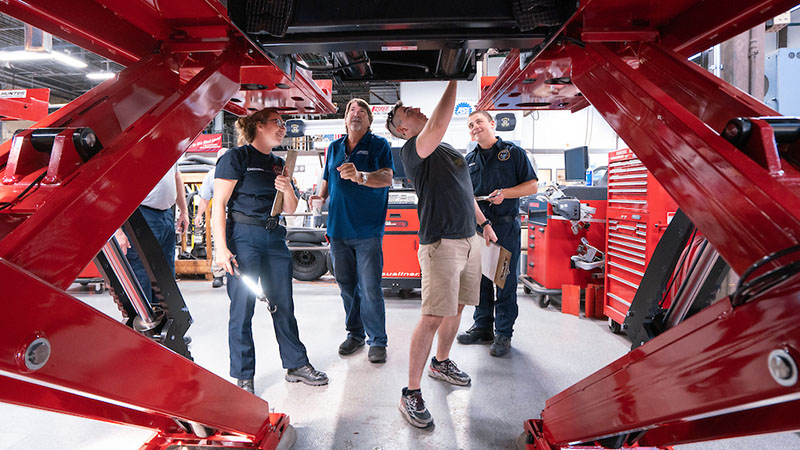
Studio Art
Build your portfolio (or just your appreciation of art) at Columbus State
Learn to express yourself through painting, drawing and design with Columbus State’s studio art courses. Students learn the practical techniques needed to bring their creative vision to life, as well as learning about the history of art. Whether you’re looking to build your portfolio, transfer to a four-year art program, fulfill an elective or just deepen your appreciation of art, these classes will help you get there. Topics range from beginning drawing to color composition and 3-D design.

Ethan Tracey – Designing a Future
Ethan Tracey is studying to be a city and regional planner – but part of the foundation is Columbus State. The Hilliard native says he chose Columbus State because of the affordable tuition and one-on-one attention. “My CState experience has been great,” Tracey says. “I feel like the professors really care and they enjoy what they teach.”

Save 40-60% on the cost of a bachelor’s degree
Students who start at Columbus State and transfer save up to 60% on the total cost of their bachelor’s degree.
Crystal Clark, English
Through her lessons on literature and composition, Clark aims to inspire a love of lifelong learning
Crystal Clark has been teaching English at Columbus State for more than 20 years. She focuses on composition, literature and creative writing, but no matter what class she’s teaching, she aims to equip students with the critical thinking skills they need to help them navigate life. “I would like to believe that opportunities have been awakened in you, that insight has been awakened in you, this quest for wanting to know and understand more has been awakened,” she says.

Andrew Nielsen: Communication is Key
Communication is key to Andrew Nielsen's role at Nationwide - a skill he honed at Columbus State.
Nielsen started his higher education at Columbus State, earning an associate of arts degree. He credits his Columbus State faculty for their high standards and willingness to work with him outside of class times. The associate of arts fulfills the first two years of a bachelor's degree, and Nielsen went on to earn a bachelor's in the History of Art at Ohio State. That got him in the door at Nationwide.
Now, Nielsen works with a network of brokers, salespeople and underwriters to sell insurance solutions to employers.
"A lot of courses at both Columbus State and Ohio State focused on writing and communication, which helped set me up for my role at Nationwide," Nielsen says. "I’m glad that I was held to a high standard so that I could be ready to get a job that has helped provide for my family financially."

Abel Kifle Andebrhan: High School Standout
The Columbus State 2020 spring graduating class included 17 high school seniors who earned a high school diploma the same month they earned a college degree. The feat is made possible by Ohio’s College Credit Plus (CCP) program. CCP allows students to take Columbus State classes and earn high school and college credits simultaneously. Abel Kifle Andebrhan, who received an Associate of Science degree, is one of those students.
The 18-year-old from Pickerington North High School began taking Columbus State classes his freshman year. “College Credit Plus was a great option for me,” says Andebrhan. “I had to learn a lot about time management and to balance everything with work and social life, but I made it happen because it's important to me.”

Social Sciences
Expand your worldview by studying the inner workings of individuals and societies.
The social sciences – anthropology, criminology, economics, geography, political science, and sociology – help us understand ourselves and the world better. These courses can help you choose a major, and often count toward the general education credits you need to transfer to a bachelor’s degree. In these classes, you’ll learn to think critically about questions like, “How does scarcity influence economics?” and “How do geographers understand the relationship between people and places?” and even, “Where do we come from?”

Mackenzie Grady – Off and Running
Mackenzie Grady earned her associate of arts degree from Columbus State in spring 2021 and transferred to Ohio State. She’s already well on her way to a degree in psychology.
“Going to Columbus State was so helpful in my transition into college. Coming from a small town near Toledo, Columbus State gave me friendship and an education all at the perfect size,” Grady says. “I graduated with the help of my advisor and professors that really came alongside me to help me get transferred to Ohio State! I am eternally grateful for the opportunities Columbus State gave me.”




